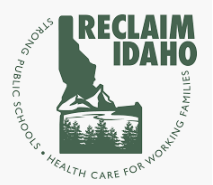Reclaim Idaho officially suspended its signature drive Thursday, ending its effort to place an education funding initiative on November’s ballots.
 The announcement followed a U.S. Supreme Court ruling from last month.
The announcement followed a U.S. Supreme Court ruling from last month.
It is not yet clear if Reclaim organizers will pursue another campaign for the 2022 general election.
“We are not ruling it out, but we have no concrete plans to launch the initiative again,” Co-founder Luke Mayville said Thursday afternoon. “It takes an enormous amount of work to organize a grassroots initiative because it’s not just the organization doing the work, it’s thousands of volunteers and local leaders around the state.”
Reclaim organizers originally suspended the campaign in March in the early days of the coronavirus pandemic. Reclaim’s “Invest in Idaho” campaign was designed to ask voters to increase funding for K-12 education by $170 million to $200 million by increasing the corporate and person income tax rates for individuals making more than $250,000 per year.
Here’s a timeline of this summer’s legal developments.
- June 8: Reclaim files a lawsuit against Gov. Brad Little and Secretary of State Lawerence Denney in federal district court, saying the stay-home order made it impossible to complete the signature drive.
- June 23: U.S. District Judge B. Lynn Winmill brought the initiative back to life and said Little and Denney violated Reclaim’s First Amendment rights when they did not take steps to accommodate Reclaim’s request to continue gathering signatures during the coronavirus pandemic.
- July 9: A U.S. Court of Appeals Ninth Circuit panel upheld an order from Winmill, agreeing Reclaim can resume signature gathering. That gave Reclaim until Aug. 26 to gather 30,000 signatures online to qualify for the November ballot.
- July 30: A U.S. Supreme Court ruling put a halt to Reclaim’s initiative drive, giving Little and Denney a legal victory. Reclaim organizers cited the Supreme Court ruling in Thursday’s announcement they officially suspended the effort.
Reclaim organizers said money from the initiative could have been used to increase teacher salaries, reduce class sizes or provide funding for all-day kindergarten.
Mayville believes voters would have approved the education funding initiative.
“The experience confirmed our hunch that the vast majority of Idahoans do support reasonable changes to the tax code in order to increase funding for education — and that’s true for rural voters and voters in every region of the state,” he said.
Even if Reclaim doesn’t relaunch the initiative similar legal disputes could arise in the future. During a Ninth Circuit Court remote hearing Thursday, justices and attorneys debated why Little used executive powers to change a number of election procedures during the pandemic, including May’s historic all-absentee primary election, but did not make changes to accommodate the signature drive.
Deputy Attorney General Robert Berry argued that Idaho law only allows for in-person signature gathering.
Some of the justices asked Berry repeatedly if Little could or would make changes to safely accommodate signature gathering if the pandemic continues during the 2022 election.
“I don’t think we are getting an answer to whether the governor has the authority and that seems to be a pretty fundamental question,” U.S. Circuit Judge Ryan D. Nelson said. “Maybe that was being decided on the fly before, but that is going to be a pretty weak argument if you come back and this case comes back in 2022.”
